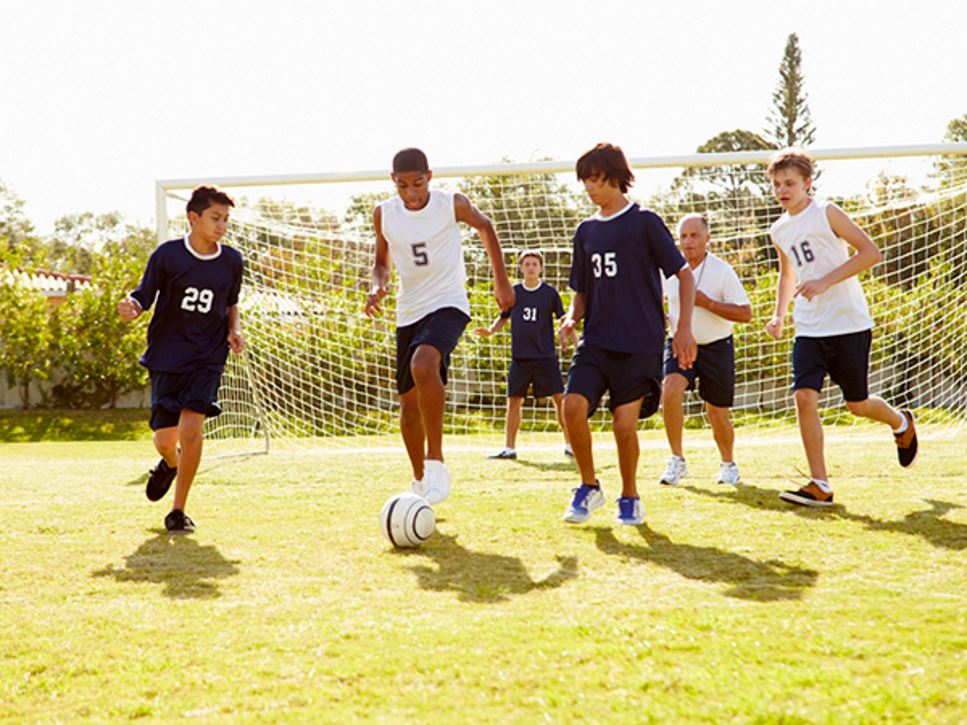Have young athletes in your family? Feeding them requires knowledge and planning. Not only do they need optimal nutrition for fueling and recovery from training, but they also must meet energy demands for growth and maturation. Help your kids refuel with the nutrients they need by focusing on family mealtimes before and after practice or gameday.
Nutrition for Everyday Athletes
- Focus on carbohydrates for energy. Choose whole-grain breads, crackers, cereals, pasta and potatoes at meals and snacks for lasting energy. Save sports drinks to help replenish fluids during endurance sports or training sessions lasting more than an hour.
- Spread out protein foods. Active bodies need protein to support growth and build and repair hardworking muscles. Young athletes should spread protein foods throughout the day, having some at each meal and with most snacks, such as eggs and whole-grain toast with fruit for breakfast or a sandwich with low-sodium deli meat on whole-grain bread with yogurt and raw veggies for lunch. Plant-based protein foods such as tofu and beans are other great choices.
- Use caution with foods higher in fat. Higher fat foods slow digestion, which is not ideal for an athlete facing a competition. Greasy, fried foods and high-fat desserts are filling and may leave your athlete feeling tired and sluggish. Skip the fries or pizza before practice, and keep fat content on the light side.
- Eat with food safety in mind. Nothing will slow down your athlete more than food poisoning — having stomach cramps, nausea, vomiting or diarrhea after eating. Make sure you store snacks at proper temperatures to prevent spoilage. Keep cheese, yogurt, meat, eggs and salads made with mayonnaise in a refrigerator or cooler. Shelf-stable items such as nuts, granola bars and whole fruit can be tossed into a sports bag without a problem.
- Flow with fluids. Good hydration should begin early in the day before kids even set foot on the playing field. Stay hydrated by drinking plenty of water during the day leading up to a game, especially in the two to four hours before game time. Continue to drink fluids during the game (about 1/2 cup every 15 minutes) and afterward to rehydrate after sweat loss. Water should still be kids' go-to drink for exercise that's under 60 minutes. Training sessions over an hour may require a sports drink to replace electrolytes lost through heavy sweating.
- Timing is everything. When you eat is just as important as what you eat. Your body needs three to four hours to digest a regular meal such as breakfast or lunch before an athletic event, while a small snack such as a granola bar can be eaten 30 minutes to an hour in advance. Load up at meals but don't overeat, and keep snacks light as you get closer to game time.
- Topping it off with milk. In addition to water, fat-free and low-fat milk are smart ways to help young athletes meet their fluid needs. But that's not all. Just one cup of milk packs 8 grams of protein per serving. It also delivers important nutrients of which most young athletes don't get enough, such as calcium, which is critical for building strong bones, transmitting nerve impulses and helping muscles contract, as well as potassium for fluid balance.
Eating right on gameday is your athlete's secret weapon for top-notch performance, whatever the sport. Here's a sample gameday nutrition plan:
- Pre-game breakfast. Gather the family together for a pre-game breakfast about three hours before the event. Serve sliced and roasted potatoes paired with scrambled eggs and fruit such as berries along with calcium-fortified 100% fruit juice or fat-free milk for a nutritious pre-game meal.
- Don't light-load or skip lunch. Many student athletes compete after school, making lunch an essential fuel source. Lunch should be hearty and include foods from as many food groups as possible, such as whole grains, lean sources of protein, fruit, vegetables and low-fat dairy.
- During the game/practice. Make sure your child stays hydrated before, during and after practices and competitions. Dehydration results when your child athlete fails to adequately replace fluid lost through sweating. Fluid loss that exceeds 2% body weight harms physical performance and may cause illness, so make sure your child stays well hydrated throughout the game with small amounts of water. Remind your child to replace fluid losses after exercise with water and look to foods such as bananas and fat-free or low-fat yogurt or milk, as they contain potassium and carbohydrates which are important to replenish after exercise.
- Post-practice or afternoon game snack. The hours after practice or a weekday competition may necessitate snacking before your family dinner. Make sure to have prepared snacks ready when your kids arrive home hungry from a tough after-school practice or game. This can include sliced fresh fruit, low-fat yogurt and smoothies.
- Post-game family dinner. For a tasty and filling post-game family dinner, include all five food groups: protein, grains, vegetables, fruits and low-fat dairy. For those who choose not to eat or drink dairy products, include choices like fortified soy milk and yogurt instead. Serve baked or broiled lean cuts of meat, poultry and seafood, such as chicken breast, salmon or tuna. Include whole grains, such as whole-wheat pasta with tomato or low-fat cheese sauce. Toss in vegetables or include a green side salad. Then, complete your meal with fruit for dessert, such as baked apples or pears topped with low-fat Greek or soy yogurt. Or create an instant yogurt parfait with layers of vanilla yogurt; fresh, frozen or canned fruit; and crunchy whole-grain cereal.
Find a Nutrition Expert
Looking for credible nutrition information and recommendations? The Academy of Nutrition and Dietetics' network of credentialed food and nutrition practitioners are ready to help!

